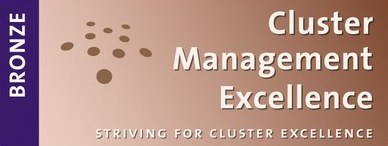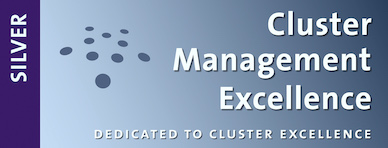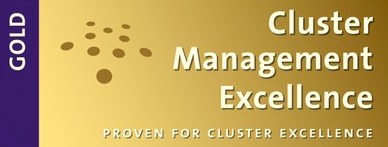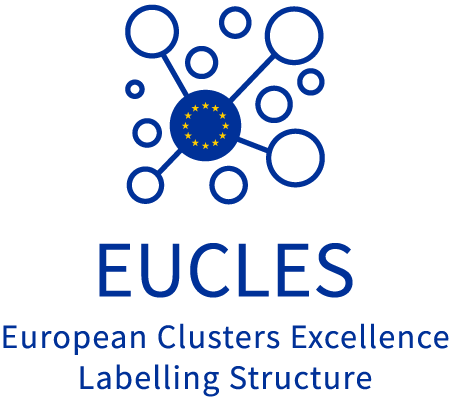Clusters are complex and dynamic structures that are subject to continuous change. Strong clusters can promote economic growth through leveraging the innovation and business potential of a region. New employment opportunities, new products and services, new companies, new R&D activities and new patents can be the result of activities within a cluster. Moreover, cluster organisations can be powerful vehicles to identify and address new (mega)trends and act as agents of change for industrial modernisation, regional economic development or entrepreneurship acceleration. For example, clusters can be used as a strategic tool to facilitate the uptake of advanced technologies, digitalisation, new business models, low-carbon and resource-efficient solutions, creativity and design, social economy, etc.
Labelling
A professional cluster management can contribute to such a development through projects and services that tap into the cluster’s potential. The European Cluster Excellence Initiative (ECEI), which was initiated by the European Commission DG Enterprise and Industry in 2009, developed methodologies and tools to support cluster organisations to improve their management capacities and capabilities. The 13 project partners of the European Cluster Excellence Initiative invented a uniform set of cluster management quality indicators and developed a quality labeling system featuring the three quality labels BRONZE, SILVER and GOLD for professional cluster management.
A review of the entire labelling system within the framework of the European Cluster Excellence Initiative – Phase II (2017-2019), which was again supported by the European Commission, resulted in a further development of the governance and management system of the labelling scheme. Main features of the new labelling system are increased transparency, efficiency and the strengthening of the European dimension of the cluster labelling.
Another new feature is the introduction of a new set of so-called Eligibility Criteria: Organisations that are interested in obtaining a quality label must prove their status as a “Cluster Organisation” as defined by the European Commission by fulfilling the set of “Eligibility Criteria for Cluster Management Excellence Labels”.
Eligibility Criteria
Applying organisations must prove their status as a “cluster organisation” as defined by the European Commission by fulfilling a set of so-called “Eligibility Criteria for Cluster Management Excellence Labels”. This new feature is one of the main outcomes of the revision of the labelling processes under the “ECEI – Phase II” project. The new set of eligibility criteria focuses on:
Existence of a real-existing technologically/sectorally/regionally focused cluster initiative with a dedicated cluster management of at least 0.5 full-time equivalent in place and at least 15 clearly committed cluster participants with a majority originating from the private sector.
The cluster management organisation must support the “enhancement of collaboration, networking and learning” and “provides or channels specialised and customised business support” to stimulate innovative activities, especially to SME. The cluster management facilitates or implements a minimum number of services (≥ 5 different activities during the past year) addressing ≥ 2 different defined strategic priority areas.
The cluster management organisation is listed on the European Cluster Collaboration Platform (ECCP).
The assessment of these criteria is up to the individual benchmarking expert. After having conducted a benchmarking interview, the expert is asked to provide her/his individual judgement regarding the degree of fulfilment of the above criteria to EUCLES including a summary whether a quality label should be awarded, or not. The final decision regarding the label award is up to EUCLES.
The Cluster Management Excellence Bronze Label
The ECEI BRONZE Label “Striving for Cluster Excellence” documents the intention of a cluster management organisation to strive for excellence by improving its management capabilities and performance levels. The label is awarded upon fulfillment of two conditions:
- the applying organisation has been benchmarked by one of the EUCLES experts
- the applying organisation fulfils the set of “Eligibility Criteria for Cluster Management Excellence Labels”
Each cluster organisation is analyzed based on an interview of the cluster manager conducted by an impartial EUCLES benchmarking expert. The interview covers 36 indicators with regard to the structure of the cluster, the cluster management and the governance of the cluster, financing of the cluster management, services provided by the cluster management, contacts and interaction within the cluster and achievements and recognition of the cluster.
Results are presented by an individual report to the cluster management and include also recommendations for further improvement in line with the requirements of the cluster quality label that is currently developed by the European Cluster Excellence Initiative.
When a cluster organisation obtains the ECEI BRONZE label for the first time, it is valid for two years from the month in which the interview was conducted. Up to one year after a valid BRONZE label expires, it can be renewed by repeating the same benchmarking process. The validity of the label is then seamlessly extended by three years from the previous validity period.
The ECEI SILVER Label “Dedicated to Cluster Excellence” confirms the successful implementation of improvement processes that were initiated following a previous Bronze Label benchmarking. Cluster management organisations that are able to demonstrate improvements in the course of an audit conducted by an impartial EUCLES cluster expert will be awarded the SILVER Label.

The Cluster Management Excellence Silver Label
The Silver Label audit is based on four steps:
- Cluster organisations subject themselves to a second Bronze Label benchmarking after 1.5 to 2 years of the first benchmarking.
- They indicate three areas with regard to the quality indicators of the European Cluster Excellence Initiative in which they have improved. For this purpose EUCLES will provide a form. Each area of improvement has to be described in a meaningful manner. The cluster organisation is expected to describe how each of the selected improvements effected the overall development of the cluster.
- The audit will then be continued by an on-site visit by an auditor to validate the indicated areas of improvement. The criteria of the GOLD Label of the European Cluster Excellence Initiative relevant to the identified areas of improvement will be used as a validation benchmark. In this context it will be also checked whether the cluster organisation meets the minimum requirements of the “Cluster Management Excellence Label GOLD”. These requirements are described the document “European Cluster Excellence Baseline – Minimum Requirements for Cluster Organisations”, which you can download here. If a cluster organisation does not meet one of these criteria the Silver Label cannot be awarded.
- The auditor will elaborate a report that details the results and includes customised recommendations for improvements.
When a cluster organisation obtains the ECEI SILVER label for the first time, it is valid for two years from the month in which the assessment was conducted. Up to one year after a valid SILVER label expires, it can be renewed by repeating the same process. The validity of the label is then seamlessly extended by three years from the previous validity period.

The Cluster Management Excellence Gold Label
The ECEI GOLD Label “Excel in Cluster Excellence” is awarded to cluster management organisations that demonstrate a high level of professionalism and sophisticated cluster management. Cluster management organisations holding a GOLD Label show their documented commitment towards a continuous improvement of their organisational structures and routines for the benefit of an even higher performance.
In order to qualify for the ECEI GOLD Label, cluster management organisations need to meet certain “levels of excellence” in terms of structure of the cluster, governance, financing, strategy and services and recognition. In the course of a thorough two-day on-site assessment, conducted by two neutral ESCA experts, 31 underlying quality indicators are assessed.
When a cluster organisation obtains the ECEI GOLD label for the first time, it is valid for two years from the month in which the assessment was conducted. Up to one year after a valid GOLD label expires, it can be renewed by repeating the same process. The validity of the label is then seamlessly extended by three years from the previous validity period.

Ready to apply to get a Cluster Management Excellence Label?
MAKE A LABELLING REQUEST
Pricing Information
EUCLES exclusively operates the labelling processes in cooperation with a broad network of specifically trained international experts. For specific purposes in the context of the labelling processes EUCLES selects and proposes the experts to be involved. An agreement is found with the cluster organisation, which expert is going to be involved. In any case a contract with EUCLES needs to be concluded according to the following processes:
Standard Process I
Standard Process I is based on an involvement of experts only for content related aspects of the labelling process. The cluster organisation (or any other organisation on behalf of the cluster organisation) concludes a respective contract with EUCLES.
Service Fee Standard Processes I:
EUCLES organises and conducts the entire labelling procedure. Any expert(s) will be sub-contracted by EUCLES.
- Cluster Benchmarking (leading to the BRONZE label, if the Eligibility Criteria have been met): ≈ 3 hours benchmarking interview via video-conference (or face to face, if the distance the expert has to cover is less than 50 km or at the premises of the expert): 1,790€ (excl. VAT)
- SILVER label process, new or renewal process (self-assessment benchmarking and ≈ 5 hours on-site assessment of the improvement areas at the premises of the cluster organisation): 4,160€ (excl. VAT)
- GOLD label process, new/first time (2 full days on-site assessment of two experts at the premises of the cluster organisation): 9,075€ (excl. VAT)
- GOLD label process, renewal of expired GOLD Label, within the first year of the expiry date of the label (1 full day on-site assessment of two experts at the premises of the cluster organisation): 7,450€ (excl. VAT)
Standard Process II
Standard process II is based on an involvement of experts for content related aspects (similar to Standard Process I) and additional administrative aspects. These processes are subject to certain restrictions and can only be performed by experienced experts with prior consultation and approval from EUCLES.
Service Fee Standard Processes II:
In order to be able to organise a labelling activity according to the Standard II processes, the expert must have concluded a contract with EUCLES in advance, as EUCLES must agree to the planned procedure and the selection of other experts to be involved, if necessary. Furthermore, EUCLES is responsible for the provision of the respective forms and documents to the expert/cluster organisation, a quality check, the validation of the results, data analysis and the final approval as well as awarding the labels to the respective cluster organisation.
- Cluster Benchmarking (leading to the BRONZE label, if the Eligibility Criteria have been met) – provision of the benchmarking report (and if applicable the BRONZE label certificate): 1,200€ (excl. VAT)
- SILVER label process, new or renewal process (provision of benchmarking report upon receiving a full set of benchmarking data self-assessment, pre-check of the eligibility of the selected improvement areas, provision of the certificate SILVER/BRONZE depending on the result of the assessment, analysis and quality check of the assessment report): 2,100€ (excl. VAT)
- GOLD label process, new/first time and renewal (analysis and quality check of the assessment report, GOLD Label approval procedure, provision of the GOLD certificate): 2,950€ (excl. VAT)
Travel expenses (within Europe) of experts – Charged additionally
In case that experts need to travel (> 50 km) to the premises of the cluster organisation, travel costs for the expert are charged additionally, consisting of 0.5 – 3 per diems per expert (depending on the specific assignment) and evidenced transport costs (by the most appropriate means of transport given the distance involved).
For assessments outside Europe, the total travel time of the expert is calculated. If experts from Europe are involved in labelling activities outside Europe, the costs are correspondingly higher and should be requested from ESCA in advance.
The abovementioned prices and additional costs are net prices. If applicable, VAT will be due.
Value-added tax (VAT)
With regard to VAT, the supplied services are subject to the reverse charge in the country of receipt, provided that the customer has a valid VAT ID number.
Otherwise the supplied services are subject to German VAT (currently 19 %) or in countries that do not belong to the EU and if applicable, the customer is responsible for paying the country-specific finance authorities the country-specific VAT at the current ruling rate.
Special cases are possible and up to discussion
In specific cases, where intermediaries or governmental implementation agencies, etc. or even single cluster organisations taking efforts to bring together an interested group of cluster organisations jointly planning their labelling efforts, discounts on the standard prices can be agreed.
EUCLES encourages to be contacted by interested parties in such cases to discuss and present feasible alternative models aiming for adding additional value to the planned processes and at the same time finding ways to reduce costs for each single label process.
The above stated standard fees are valid for cluster organisations originated in Europe. Cluster organisations from outside Europe are in general eligible as well to apply for one of the labels. Terms, conditions and prices need to be specifically discussed. In any case, please contact EUCLES for details.
